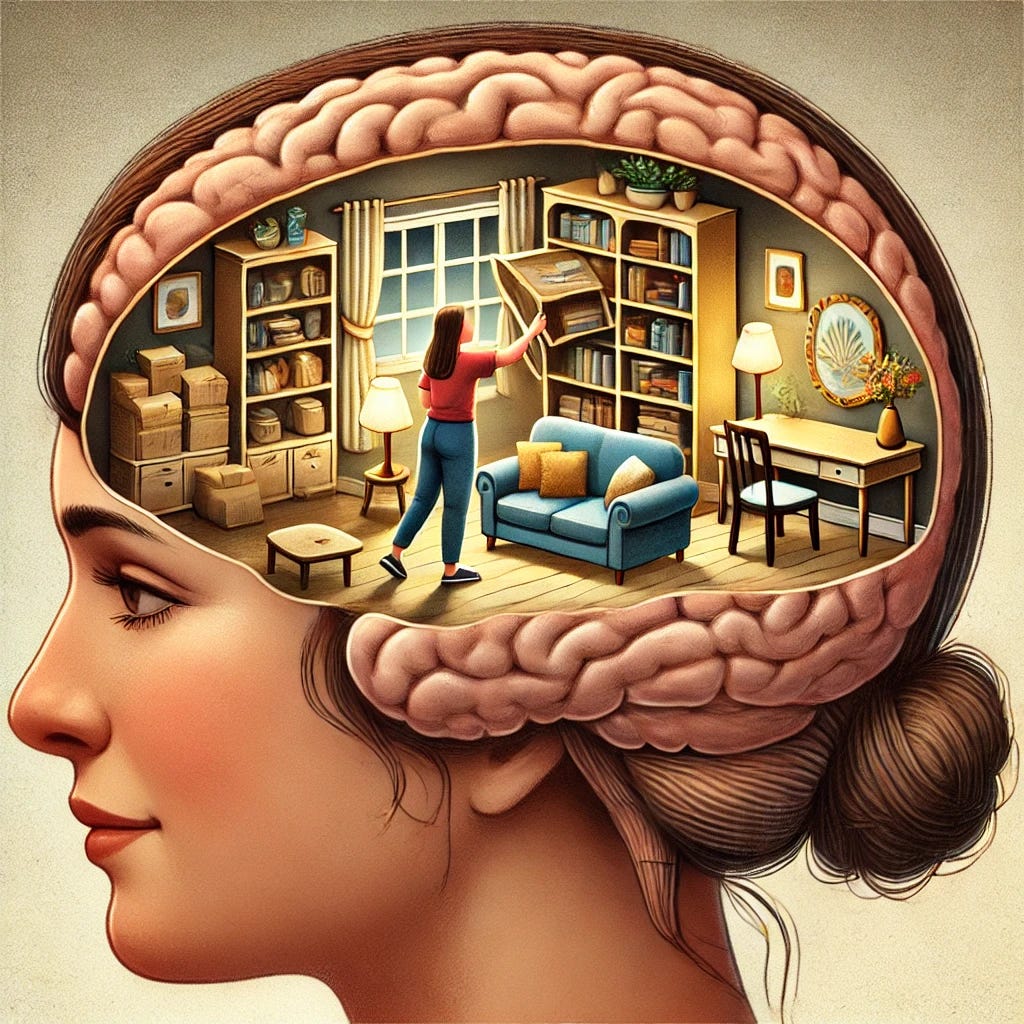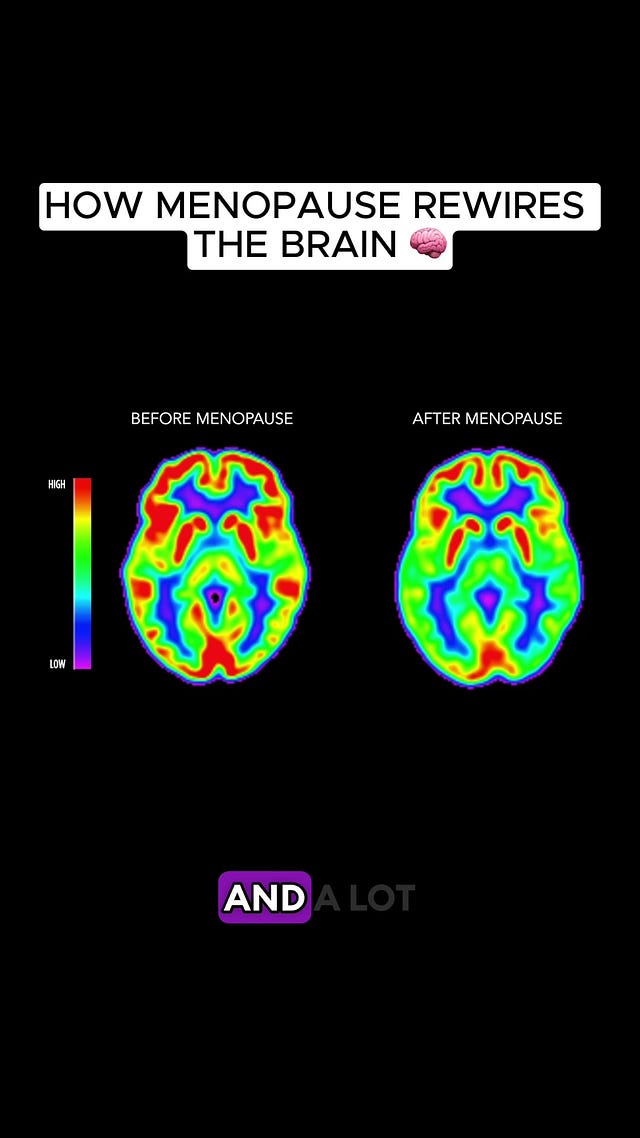Menopause Turns Our Brains Into a Scary Remodelling Project
Menopause is a “renovation project on the brain.” Science shows that the brain fog and mental fatigue we feel is a result of our brains changing
We all understand that during menopause, the body’s estrogen production decreases. Due to this, we stop menstruating. Goodbye to cramps, tampons, pads and period underwear, hurray.
70% of women participating in a 2022 survey by Good Housekeeping said that not having to deal with a potential bloody mess every month was their favorite thing about menopause.
I had a hysterectomy at 40. And though there were some undesired changes - like the complete loss of my eyebrows - I never missed having my period, ever.
What we don’t know, however, is that our brain is undergoing a restructuring process. A change that can be seen in brain scans.
So once we go into perimenopause, the change in estrogen levels also leads to “brain fog,” depression, anxiety and mood disorders.
For a long time, doctors told us that we were imagining everything and that it was all in our heads - pun intended. We were told that there was nothing wrong with us. Or that forgetfulness, sadness and depression were normal in old age and that we just had to deal with it.
Of course, none of these doctors bothered to investigate if there was a connection between our changing hormone levels and the changes in our cognitive abilities. Why would they? Women’s bodies aren’t that different from men’s, are they?
If men don’t experience these things, we must be making them up, right? No need to spend money and time researching women’s health.
Sorry for the sarcasm, but as Professor Emily Jacobs reports, only 0.5% of neuroscience studies look at women’s health. No joke.
So until not too long ago, women who insisted that there was something wrong or displayed changes in behavior during the menopause transition were deemed hysterical and admitted into asylums by these doctors.
But now we know there’s strong scientific evidence that our brain changes during menopause due to the change in estrogen levels.
For the past couple of years, I’ve been struggling. I’ve had episodes of anxiety, depression, and forgetfulness. Sometimes, I even feel as if I have developed late-onset attention deficiency syndrome. I can’t concentrate.
When I read Dr. Mary C. Haver’s book “The New Menopause,” I had to listen to the audiobooks and read the text at the same time. That was the only way I could focus on what I was reading. Crazy.
That was an especially bad day, but concentration issues aren’t uncommon.
In research conducted by the British Menopause Society, almost 40% of the women interviewed reported memory and concentration issues as they go through the menopause.
Having problems focusing is a big obstacle when you’re trying to succeed in the workplace. Along with other mental issues, it’s one of the big reasons women quit their jobs during the menopause transition.
If you haven’t, go read Tracy Collins’ guest piece on how mental issues during perimenopause made her quit her job.
Despite the medical field ignoring these (peri)menopause symptoms for a long time, there’s actually a real biological reason for them.
One of the many things I didn’t know about my body was that the brain has estrogen receptors.
17β-estradiol, the most biologically active estrogen, exerts wide-ranging effects in the brain through its action on estrogen receptors (ERs), influencing higher-order cognitive function and neurobiological aging.
In 2021, a groundbreaking study by neuroscientist Dr. Lisa Mosconi finally showed how the changes in estrogen levels result in changes in brain tissue.
It proves that when estrogen levels change during (peri)menopause, the brain changes as well. You’re not imagining it.
Menopause is a “renovation project on the brain.”
According to this research, the way the brain uses glucose changes, and so does the wiring of your brain (the synapses). The rate at which glucose is metabolized in the brain decreases, as does gray matter.
In female animals, estrogen depletion has even been linked to plaque accumulation in the brain, which is a known indication of Alzheimer’s disease.
 Tiktok failed to load.
Tiktok failed to load.Enable 3rd party cookies or use another browser
Yes, it is a “natural” process that all people born female will go through at some point. But the experience differs. Many women have an easy time and breeze right through it, but for just as many, it isn’t easy.
A lot of women are vulnerable to the neurological shifts that occur during this time, experiencing depression, anxiety, and, worst case, Alzheimer’s disease.
70% of women experience neurological symptoms during the menopausal transition, says Emily Jacobs, an associate professor at the University of California at Santa Barbara and director of the Ann S Bowers women’s brain health initiative.
As scary as that sounds, it's good to know you're not imagining the changes your brain is going through. Yes, you're suffering from mood swings, difficulty concentrating, brain fog and perhaps even anxiety.
These aren't just signs of aging. These symptoms are directly related to (peri)menopause.
But the good news is that hormone replacement therapy (HRT) can help.
And, for most of us, many of these changes are only temporary – such as a decrease in the volume of gray matter in the part of the brain responsible for memory. The brain will try compensating for these changes by increasing blood flow and energy production.
And, of course, you can help your body and brain with the usual suspects while all this is happening.
Healthy diet, exercise, positive social interactions and stress management. Regular sleep. Avoid alcohol, limit your coffee consumption and don’t smoke.
Yes, I know, all the things we’re supposed to be doing anyway.
But the truth is, it matters more now. Your body won’t let you get away with abusing it like you did in your 20s and 30s.
Nowadays, I immediately notice when my sleep is off or when I had alcohol the day before or had too much sugar, and not in a good way. But some days, when I get every factor just right, I feel like I used to before MT, and those days are glorious.
If you’ve enjoyed this story and want to support “My Menopause Brain,” buy me a cup of coffee! For more of my writing, and don’t forget to follow me on Threads or Linkedin.





It's really important that people know that the HRT study in 2002 (was it? or 2003) was grossly misrepresented not only in the media but that doctors being trained in gynecology shied away from it! I was perimenopausal right in the middle of the announcement of the ending of the study, but thankfully my gyn and my reading of Women's Moods by Deborah Sichel and Jeanne Driscoll gave me enough background (along with an ability to read research, thank goodness) not to freak out. I'm shocked to be listening to a podcast recorded in 2023 that very little has changed and women are not getting the care they need! 20 years have passed, people!
Thanks for this! I'm so grateful (mostly women) are now finally doing the research and writing so those of us going through this transition understand it's communal and biological and not an individual failure or pathology. So grateful!